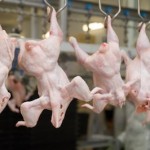Environmental Working Group has released a report called Broken Stream Banks that found pollution from farmland is a major problem in southern Minnesota, and wherever row crops are common in the U.S. the report states that this issue can be solved with the use of buffers, including grass strips, trees, and permanent vegetation. The report found that only 18% of perennial river and stream banks that are in agricultural areas are fully protected. Minnesota is a leader in fighting agricultural pollution with its Shoreland Management Act. That legislation places legal protection of "riparian" buffers between farmland and waterways. But the law is not being enforced across the state. There is a required 50-foot riparian buffer between farm land and waterways. EWG states that 170 waterways … [Read more...]
Food & Water Watch Targets Maryland Poultry Industry Polluters
Food & Water Watch is targeting poultry industries in Maryland that contribute to nutrient pollution in the Chesapeake Bay. Legislation introduced by Senator Richard Madaleno (D-18) and Delegate Shane Robinson (D-39), called the Poultry Fair Share Act, would hold Maryland's big poultry companies partially accountable for cleanup. Water quality in the Chesapeake Bay watershed has declined in recent years. Factory poultry farms on Maryland's Eastern Shore make a billion and a half pounds of waste every year. Contract growers are forced to dump excess chicken manure on saturated farm fields because these companies will not handle the waste themselves. Runoff ends up in the Bay and its tributaries. Food Poisoning Bulletin told you about this problem last month. Phosphorous pollution … [Read more...]
Rare Toxin Found in Fish Becoming More Common
Because of harmful algal blooms, a rare illness caused by a toxin in fish is becoming more common in the United States. Ciguatera poisoning is the most common seafood-related illness in the world. It used to occur only in fishing communities located in the tropics, but the algae that produces the toxin has been found in fish caught off the waters in Florida, Texas, South Carolina, and Miami and caused outbreaks. And the globalization of our food supply has caused outbreaks in Alaska and Ohio. Food poisoning usually occurs in several ways: You eat food infected with bacteria or viruses that cause an infection, or you ingest chemicals or toxins present in contaminated food. Parasites, prions (mad cow disease) and protozoa can also cause food poisoning. Ciguatera is a foodborne illness … [Read more...]






